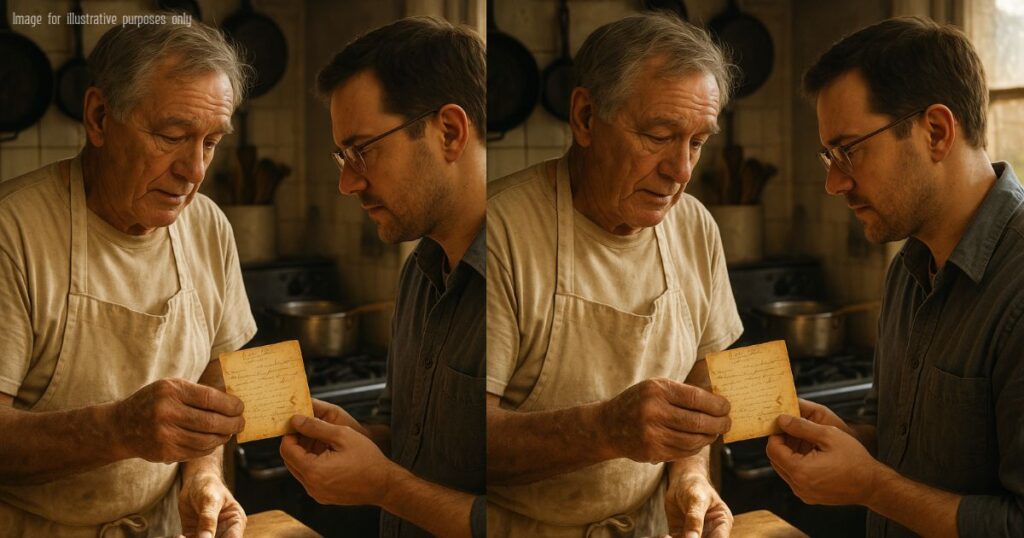“I don’t care what you write in your little code books—this is how you keep a sauce from breaking.”
Frank slammed the wooden spoon against the pot, thick with steam and garlic. The kitchen smelled like home—onions sweating in butter, old tile sweating from the July heat, and something else: time. Time layered into the walls like smoke and gravy and stories too tired to tell.
He stood in the same spot he had for 38 years—right beneath the yellowed ceiling fan that wobbled like an arthritic wrist, beside the six-burner Garland stove he bought secondhand in ’89. Back when he and Gloria ran the place together, before her lungs gave out and his knees turned to gravel.
The restaurant was closed now. Had been for three years. But Frank still unlocked the doors every morning at six, same as always. Some habits were deeper than memory. He didn’t cook for customers anymore—just himself, the grandkids when they visited, and once a week, the church ladies who came in for meatloaf and stories.
But today wasn’t about habit. Today, his son was coming home.
Not just for a visit, either.
“He wants to learn,” his daughter-in-law had said over the phone, voice tight with hope and hesitation. “He wants to… try again. With you.”
Kyle hadn’t set foot in the kitchen since he was nineteen.
Back then, all he saw were greasy aprons, burned fingertips, and the smell of other people’s hunger. Frank tried to show him the ropes—how to make biscuits from memory, how to tell the temperature of oil by sound—but Kyle kept talking about algorithms and “sprints” and something called Java that didn’t come in a cup.
He left for college in Oregon and never came back—not really.
They spoke at Christmas, sometimes on birthdays. Gloria had kept them from drifting too far, but after her funeral, the calls grew shorter. Frank didn’t know what to say to a man who lived on screens and barely ate bread.
Until last week.
“I don’t know how to make pancakes,” Kyle had confessed, awkward and low. “I’ve been feeding my son frozen waffles. He asked if Grandpa could teach me.”
That was all it took.
Frank cleaned the kitchen like it was the first day of business in ’84. He lined up the worn cast iron pans, sharpened every knife on the block, and laid out his old recipe cards—handwritten, stained, corners curled like bacon.
Some were nearly unreadable now. But he didn’t need the words. He needed the hands that wrote them.
Kyle arrived with his little boy in tow. The kid looked about five, shy, clutching a toy fire truck. He had his mother’s eyes but Frank’s cowlick, and when Frank held out a flour-covered hand, the boy grabbed it without fear.
“I want to learn pancakes,” he said. “The fluffy kind. Not the floppy ones Daddy makes.”
Kyle laughed, sheepish.
Frank didn’t.
“We’ll start with biscuits,” he said. “If you can’t make biscuits, you’ve got no business making pancakes.”
They spent the morning elbow-deep in flour. Kyle fumbled with the dough, overmixed it, then underworked it. He spilled buttermilk, burned the bottom batch, and got scolded for flattening them with a rolling pin.
“Biscuits aren’t soldiers. They’re clouds with a crust.”
By noon, the kitchen was a mess of laughter, powdered sugar, and memories Frank didn’t know he still had. He watched his son lean over the stove, brow furrowed, checking for the rise in the oven window—just like he used to. The boy ran circles around the prep table, scooping sugar and naming spoons like pets.
Then Kyle asked, softly: “Why’d you never show me this when I was younger?”
Frank looked up from the cutting board. “I tried. But you wanted clean hands. You thought this was noise.”
Kyle didn’t argue. Just nodded.
“I still do,” he said. “But I want my son to hear it.”
They returned every Saturday.
Each week, a new dish: pot roast, cornbread, stuffed peppers, peach cobbler. The kid became the official taster. Kyle grew more confident—he cracked eggs one-handed, learned to feel heat without flinching, asked questions Frank had waited thirty years to hear.
One day, Kyle brought in a printed document.
“I made digital copies of your recipe cards,” he said. “Scanned them, cleaned up the handwriting. Just in case.”
Frank stared at the screen. The lines looked sterile, too neat. Like a museum label, not a meal.
He opened a drawer and pulled out an old card—banana bread, 1987. Gloria’s handwriting, flour-smudged.
He handed it to Kyle.
“Keep this one,” he said. “You’ll need to remember how it smelled.”
On the last Saturday of August, Frank didn’t cook.
He let Kyle lead the kitchen, while he sat at the booth near the window—same one he and Gloria always shared after closing. Outside, the town was quiet, like most of the downtowns in America now. The movie theater was a vape shop. The barber pole didn’t spin anymore.
But inside, the kitchen was alive again.
Flour in the air. Heat in the walls. Laughter skipping across the tile like a skipping stone.
Frank felt something shift in his chest. Not pain exactly. Just… full.
Two weeks later, Kyle unlocked the restaurant for the first time without his father.
Frank had passed in his sleep, apron still on the hook, recipe cards stacked by the stove.
The will was short. He left the building to Kyle. Said nothing about money, or business plans, or keeping things the same.
Just one sentence in his shaky, looping hand:
“Feed them like they matter.”
Final Line:
And every Saturday since, the kitchen still fills with butter and stories—and somewhere between the biscuits and the quiet, a little boy grows up knowing exactly what love tastes like.


